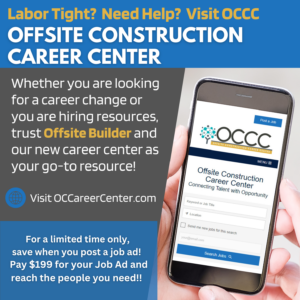Starting a modular factory is an ambitious endeavor, but it’s one that more and more individuals, builders, developers and even those with absolutely no industry experience feel the need to attempt. The modular industry is rapidly gaining an allure that has been missing until now, and as a result, it’s attracting money like never before.
Modular construction promises to revolutionize the building industry through efficiency and innovation, but the path to success is filled with challenges. To meet those challenges, a factory needs meticulous planning, strategic marketing and robust financial management. What follows are some of the critical steps and considerations necessary to establish a thriving modular factory.
Lay the Groundwork. Embarking on the journey of creating a modular factory without a detailed plan is like attempting to build a home without blueprints. It’s not a recipe for success.
A comprehensive plan is the foundation on which all subsequent actions are built. It should include several sub-plans:
- A Startup Plan that outlines the initial steps, timelines and resources required to launch the factory.
- A Business Plan that provides an in-depth analysis of the market, identifies target customers, delineates competitive strategies and includes financial projections.
- A Manufacturing Plan that details the production processes, equipment needs, quality control measures and workflow designs.
- A Contingency Plan that prepares the business for potential challenges and outlines strategies for risk mitigation.
Neglecting any of these items can lead to operational inefficiencies and strategic misalignments, ultimately jeopardizing the factory’s success.
Recruit Good Leaders. Assembling a great leadership team is an obvious imperative. But it can be more of a challenge in modular than in other industries.
In most mature industries, startups can tap a talent pool that has been molded by years of experience. Modular is different. The most knowledgeable people are the first set of industry pioneers, and they’re at retirement age. The industry is coming into its own at a time when its most experienced people are exiting. The ones who remain are valuable and in short supply.
Fortunately, modular has the option to recruit from other manufacturing industries. There are plenty of talented professionals out there with the skills needed to quickly learn this industry’s quirks and the vision needed to build on the past and drive success into the future. These leaders should exhibit a blend of technical expertise, strategic foresight and the ability to foster a culture of innovation and resilience.
Know Your Market. “If I build it, they will come” is not a strategy. You need to build demand before providing supply. A modular factory is a hungry beast. It has to eat, and it eats orders. It has a voracious appetite for orders, and it must be fed.
How do you get orders? As with any business, you need to define the specific market the factory will serve. Be careful here. Many factories start out planning to manufacture large multifamily projects, because they assume that such projects will keep their production pipeline full. It’s a faulty assumption. Big projects get delayed because of funding, permit issues, etc. A factory can’t plan around these delays.
The solution is what I call the “Marbles in the Mason Jar” analogy. To maintain a full production line, you should be building those large projects (filling the mason jar with marbles), but also taking on smaller projects (the sand) that you can use to fill in the gaps. Those small projects will keep your production line running during big-project delays just as the sand keeps the mason jar 100% full.
Don’t Forget Design. To profitably serve your market, you also need the ability to design homes and projects that give customers what they want, and that are engineered to work with your manufacturing process. And you need the ability to price them rapidly for success. Clients need a price for a defined project before the factory can ever get an order. First things need to come first.
Finally, you should always be ready to pivot from your original business plan when necessary. Mike Tyson famously said, “Everyone has a plan until they get punched in the face.” In today’s economy and construction environment, the only thing you can count on is getting punched in the face at least once. Here’s to your successful factory startup!
If you liked this article, you can follow Ken Semler on LinkedIn, where he offers daily insights and commentary about offsite construction.







